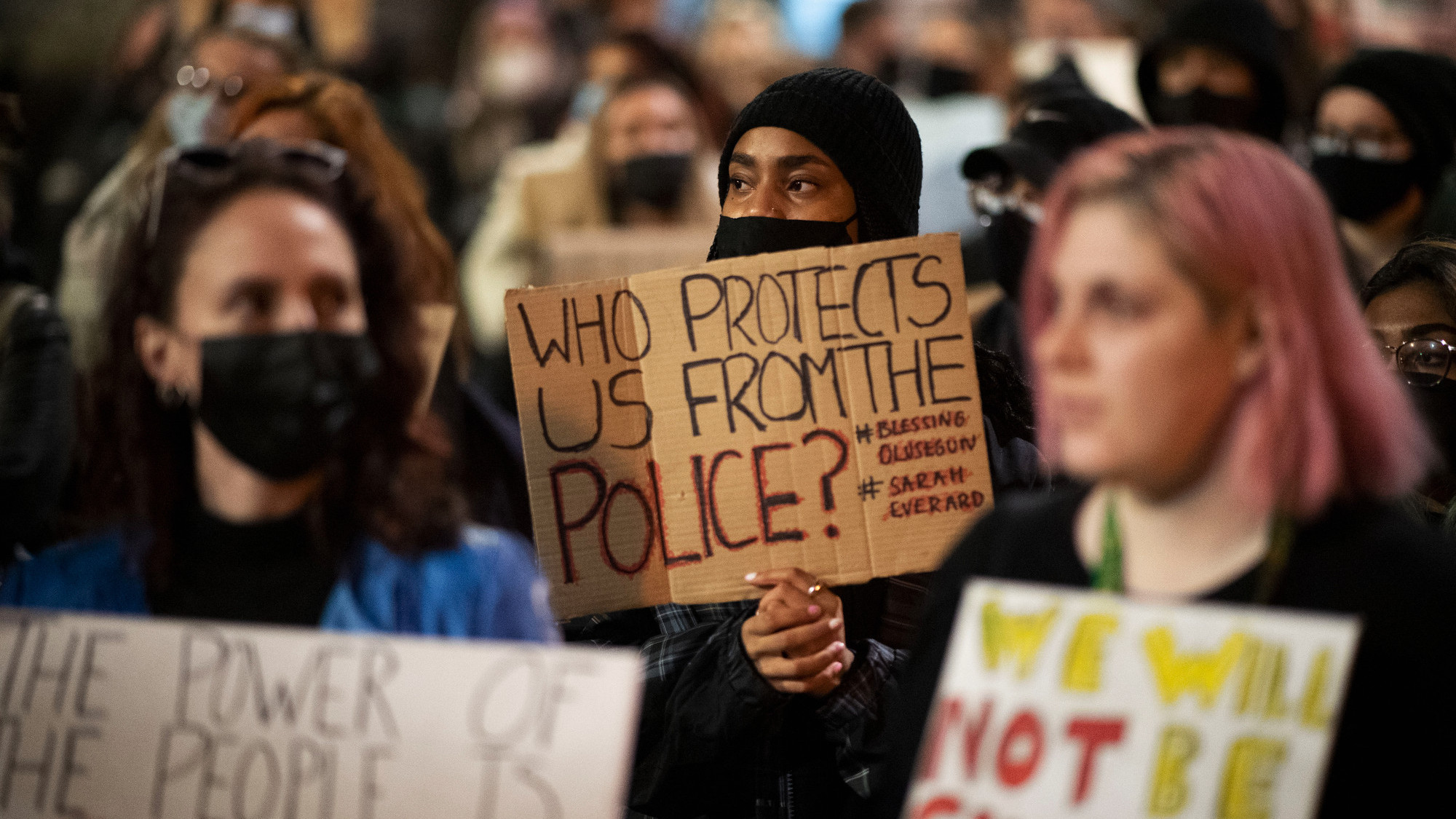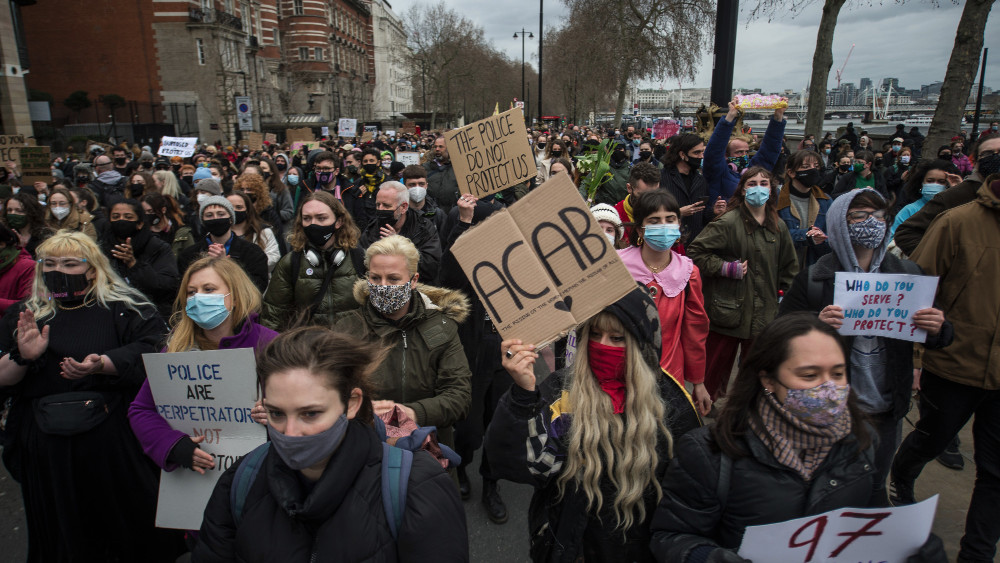Why women are often right to be scared of the police
Shocking new figures revealing the Metropolitan Police's record of violence against women have added to the air of mistrust left by Sarah Everard’s death. Lizzy Dening argues how the system isn't working and why sweeping changes need to happen fast


Celebrity news, beauty, fashion advice, and fascinating features, delivered straight to your inbox!
You are now subscribed
Your newsletter sign-up was successful
Shocking new figures revealing the Metropolitan Police's record of violence against women have added to the air of mistrust left by Sarah Everard’s death. Lizzy Dening argues how the system isn't working and why sweeping changes need to happen fast
Several high-profile news stories recently have left women from all backgrounds sharing a common sentiment on social media: we are frightened of the police. And while not all Metropolitan Police officers are the same, the problem – as with the #notallmen argument – is that it’s often hard to tell the difference between someone who’s on your side versus an individual who poses a threat, until it’s too late.
Is it an endemic problem?
The most recent conversation has been sparked in part by the tragic Sarah Everard case - first the arrest of a Met officer in connection with her murder, and then the use of undue force by police at her vigil. Quick enough to give you whiplash, these stories were followed by the awful news that PC Oliver Banfield, in the West Midlands, has avoided prison despite drunkenly attacking a woman. (And Downing Street wonders why its plan to bring undercover police into clubs to help protect women hasn’t been greeted with open arms…)
These dreadful individual stories seem to point to an endemic problem. Recently a catalogue of sexual misconduct complaints about officers within the Metropolitan Police was revealed. The complaints – almost 600 in total – included shocking claims that one abused the vulnerability of a rape victim by having sex with her, and another assaulted a domestic abuse survivor.

It’s an appalling list of harassment, sexual assault and rape, showing officers exploiting their power, failing to protect, and often inflicting new levels of pain and violence on those seeking help. Sadly, I suspect this is the tip of the iceberg: as many survivors feel unable to report sexual violence in general, one can only imagine how much harder it is to report when the perpetrator is an officer.
Shame on the force
And as well as the acts themselves, there’s a second element of shame for the force: how these allegations were dealt with. Of the 594 complaints, dated between 2012 and 2018, a mere 119 were upheld. One officer accused of raping a woman he’d met whilst on duty was given a verbal warning and management advice for his actions - the lowest level of punishment available following a misconduct hearing.
The abuse of police power against women across the UK more widely also came to light two years ago, after a similar FOI request. It found that there had been almost 1,500 accusations of police abuse (including sexual, child abuse and exploitation) between 2012 and 2017, with just 371 upheld. (And that’s without ten police forces providing data.) This potentially means that either many forces fail to take this seriously – or potentially cover up allegations – and also that many accused of violence are still working in the field.
Celebrity news, beauty, fashion advice, and fascinating features, delivered straight to your inbox!
Justice for survivors
In order to instil change across the board – not to mention getting justice for survivors – it’s vital that forces truly examine each and every case, including asking uncomfortable questions. ‘In many cases the officer’s conduct was considered to be an isolated case of appalling misconduct and the opportunity was not taken to examine the surrounding circumstances,’ found a report into the abuse of police powers to perpetrate sexual violence by the Independent Police Complaints Commission, from 2012.
This is a misconception we see again and again: the idea that it’s a few ‘bad apples’ rather than a problem in professional structures, and indeed, wider society. When you look at a case on its own – one police officer who has attacked a woman – it’s convenient for an organisation to assume it’s just a problem with that individual. In the wider world, from the press to corporations, you hear the same applied to rapists, murderers, and anyone exhibiting dominant, dangerous behaviour. That person may be deeply disturbed but once they’ve been caught we can all carry on as normal. It wilfully misses the point.
We are living in grossly unequal times, where the powerful are often allowed to exploit others and get away with it. We hear all-too frequent stories of police violence from Black people, LGBTQ+ people, and from minority groups. It’s clear that the system that’s meant to offer protection from hostility isn’t working for the people who need it most.
The Met and other forces are now under public pressure to make sweeping changes, but for many women, and in particular for those grieving for friends or family lost to violence, making us feel safe will be a hell of a gap to bridge.
* Lizzy Dening is the founder of Survivor Stories: an award-winning platform featuring long-form interviews with survivors of sexual violence in their own words
* HELP & SUPPORT Please remember you're not alone if you've been affected by sexual violence. These helpines are here for you. Free and confidential support is available from Rape Crisis. * England & Wales: rapecrisis.org.uk * Scotland: rapecrisisscotland.org.uk * Northern Ireland: rapecrisisni.org.uk
* Anyone seeking professional support can also contact Victim Support’s 24/7 Supportline on 0808 16 89 111 or use their live chat services via the website, victimsupport.org.uk
Lizzy Dening is a freelance journalist and editor, specialising in writing about sexual violence, women’s rights, opinion pieces and health. Also, when in need of a break from the bleaker stuff, the odd travel piece or film and book review.
She’s the founder of Survivor Stories, a website featuring interviews with survivors of sexual violence in their own words, and is co-vice chair of Peterborough Rape Crisis Care Group. She’s passionate about listening to survivors, helping them share their stories and shutting down victim blaming. As you might imagine, she’s a right laugh at dinner parties.
She’s been previously published by titles including The Guardian, Grazia, Elle, The Independent, iPaper, the Telegraph, Huffington Post and Women’s Health, and has been digital editor at two national titles. Now self-employed, she considers her cat Moomin her closest colleague, although he’s unreliable when it comes to the tea-round.
Originally from Cambridge, she now lives in Peterborough where she regularly organises events including an annual Reclaim the Night march, feminist film screenings and fundraisers for Peterborough Rape Crisis. She’s also a volunteer at a local food bank (bag packing rate: ninja level) and does occasional PR and comms work for charities and causes. There’s rarely a petition she hasn’t signed.
Avid reader and book club botherer; champion of niche feminist icons; currently learning to play football; wears too much leopard print; sometime poet; Kinder Egg enthusiast; spends a lot of time thinking about going for a run. Favourite places include Sheringham beach, New York, Vienna, Hawaii, obscure museums, the local park, and bookshops.
Currently in the process of launching her first podcast with her (award-winning) podcast producer husband, Ross Sutherland – watch this space…
